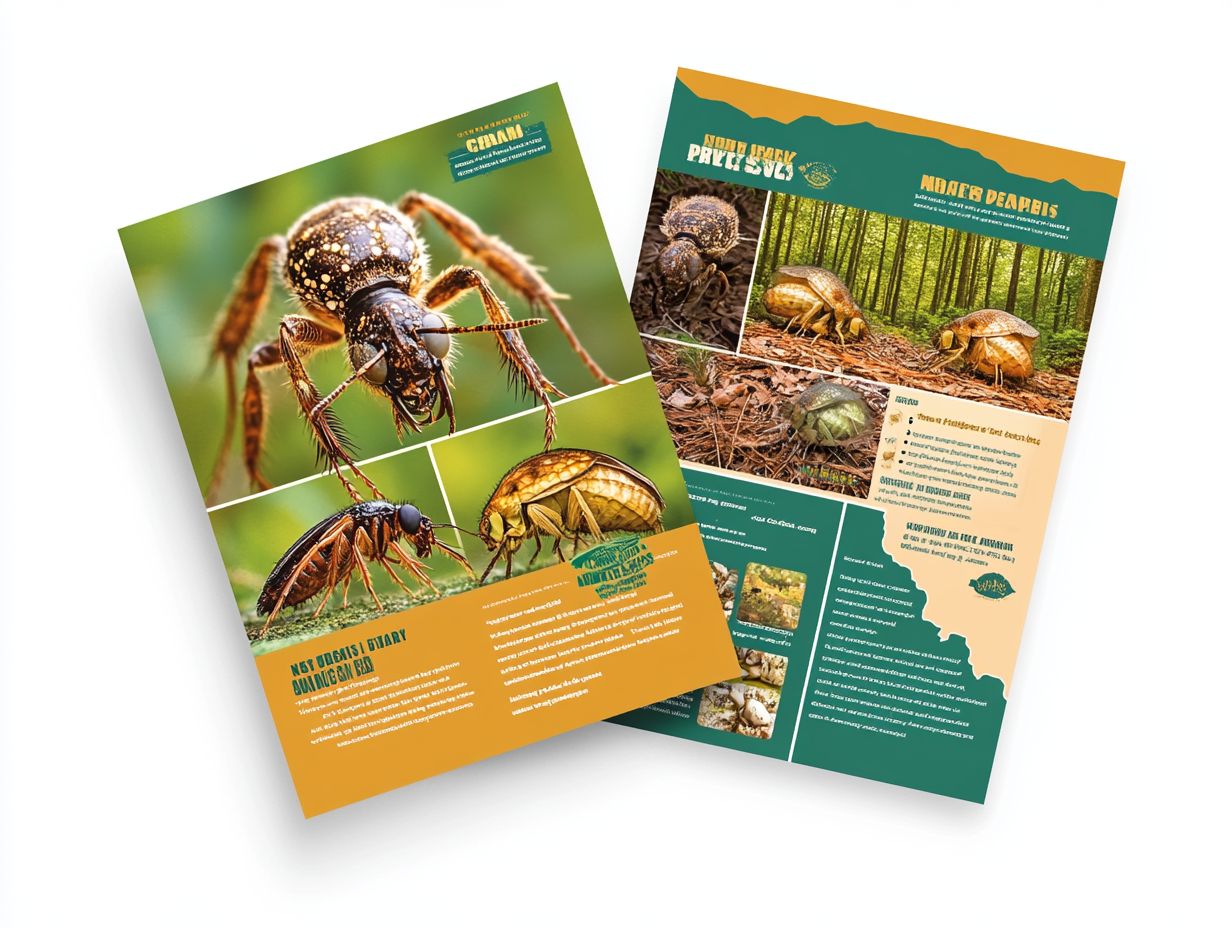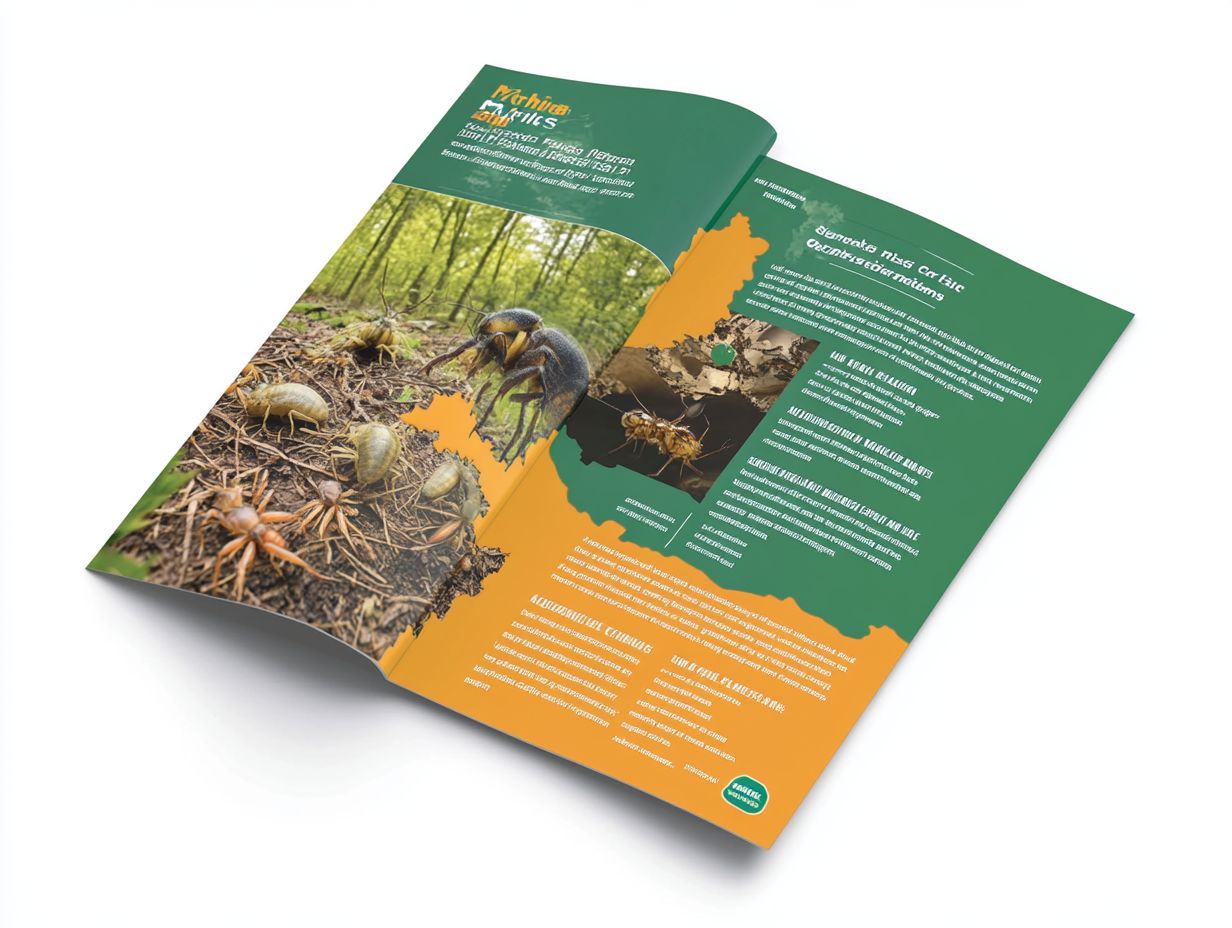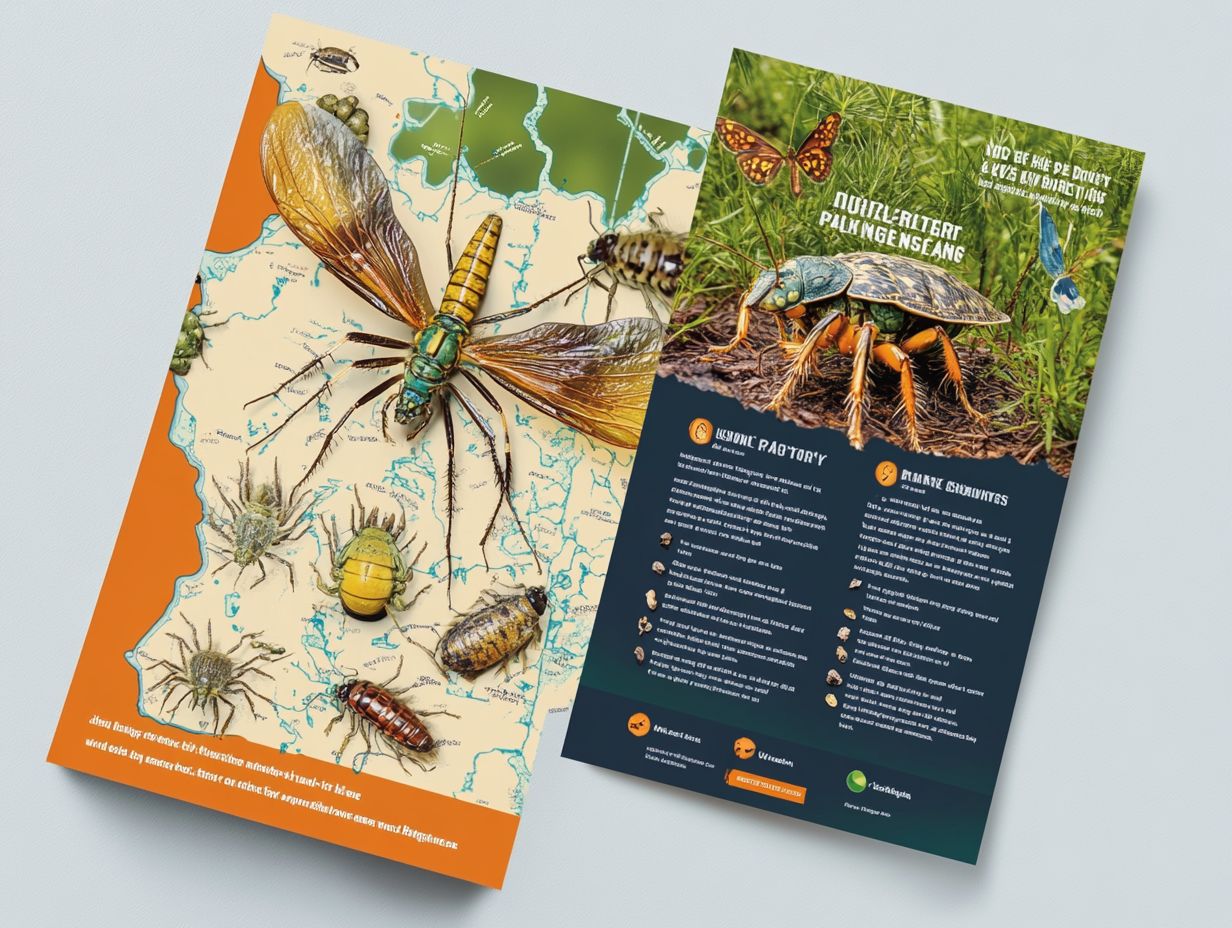In the competitive world of pest control services, effective marketing is your secret weapon for standing out and attracting clients.
This article dives into the concept of pest control marketing and emphasizes how crucial it is for driving your business growth and engaging customers. You'll want to figure out who your target audience is and explore the various marketing channels available—from digital avenues to good old-fashioned print.
Plus, we’ll cover the key elements that make up a successful strategy.
With practical tactics and insights into effective branding, this guide is designed to help you optimize your pest control marketing efforts and thrive in North Carolina's bustling market.
What Is Pest Control Marketing?

Pest control marketing is your secret weapon for promoting your pest control services effectively in North Carolina and beyond. This approach includes a mix of tactics like digital marketing, SEO, and local SEO to help you stand out and attract the right customers.
By using online advertising platforms and optimizing your website for search engines, you can connect with potential clients in your service area. Plus, building a strong online reputation through customer reviews and testimonials can really make a difference in how people perceive your business.
Why Is Pest Control Marketing Important?
Understanding why pest control marketing is essential can really boost your business growth and customer acquisition strategies. Effective marketing doesn’t just raise awareness for your pest control services; it also helps you stand out in a competitive market like North Carolina.
By rolling out targeted marketing campaigns, you’ll engage your audience in a way that makes an impact, improving your presence in the service area and enhancing customer retention with smart pest prevention and treatment plans.
Who Is the Target Audience for Pest Control Marketing?
Identifying the right target audience is key to making your pest control marketing initiative a success. In North Carolina, pest control services serve a variety of clients, from homeowners to businesses, each with their own unique needs and expectations.
By understanding the demographics and behaviors of your target audience, you can tailor your marketing campaigns to hit the mark, making sure your messaging really resonates with potential customers looking for pest management solutions.
What Are the Different Types of Pest Control Marketing?
You’ve got a bunch of pest control marketing strategies at your fingertips that can really help you connect with your audience and boost your brand visibility.
From digital tactics like SEO and social media marketing to more traditional methods such as print ads and direct mail, each approach has its own perks when it comes to promoting your pest control services.
Plus, don’t underestimate the power of email marketing and getting involved in your local community—they can supercharge your outreach efforts and take your overall marketing success to the next level.
1. Digital Marketing
Digital marketing is a must-have in your modern pest control marketing toolkit. It helps you promote your services online in a way that really gets noticed. You’ll want to focus on optimizing your website for search engines using SEO techniques, running pay-per-click campaigns, and diving into social media platforms to connect with potential customers.
Plus, digital marketing gives you access to detailed analytics and A/B testing, which means you can fine-tune your strategies for better conversion rates.
By putting together a solid SEO strategy, you can boost your online presence, making it easy for potential customers to find your services when they’re searching for pest management solutions. Effective website optimization is key, so make sure you’re enhancing user experience, ensuring your load times are quick, and creating engaging content that tackles common pest-related questions.
Don’t forget about analytics tools—they’re crucial for understanding customer behavior and preferences. This way, you can tailor your marketing messages to hit the mark. When you combine targeted outreach with data-driven decision-making, you’ll see an increase in visibility, drawing in a wider customer base ready to tackle their pest problems.
2. Print Advertising
Print advertising is still a powerful tool for your pest control marketing, especially when it comes to connecting with local audiences in North Carolina. Think brochures, flyers, and direct mail campaigns—they can effectively promote your pest control services and build brand awareness right in your community. By making sure your print materials feature local citations and compelling calls-to-action, you can boost customer engagement and drive more traffic to your website.
These formats not only let you create visually appealing designs but also give you a chance to highlight specific local pests and share seasonal tips that really resonate with potential customers. Adding elements like customer testimonials and showcasing local partnerships can really enhance your credibility and build trust.
When you implement these strategies, you'll not only grab attention but also encourage action, leading to more inquiries and bookings for your pest control services. Ultimately, the combination of print advertising and localized content is key to establishing a strong brand presence and driving sustainable growth.
3. Direct Mail Marketing

Direct mail marketing is a smart way for you to connect with potential customers right in your service area. It lets you craft targeted campaigns that really speak to their needs. By sending out promotional offers and helpful information directly to households and businesses, you can boost your customer outreach and attract new clients. Plus, this approach creates a personal connection with your audience, making them more likely to respond and engage.
Using direct mail allows you to tailor your messages based on demographic data or previous service inquiries, ensuring that what you send is relevant and appealing to each recipient. You can highlight seasonal services or special discounts, prompting immediate actions like scheduling an inspection or stepping up routine maintenance.
The physical nature of printed materials can make a lasting impression, helping potential clients remember your offer when they need your services. By weaving direct mail into your digital marketing efforts, you can create a cohesive strategy that maximizes your impact and effectiveness.
4. Event Marketing
Event marketing is a game-changer for your pest control business, giving you the chance to engage directly with your audience through trade shows and local community events. When you take part in these gatherings, you can showcase your expertise, educate potential customers about pest prevention, and highlight the services you offer. Plus, networking at these events opens the door to valuable partnerships and collaborations within the pest control industry.
These events are perfect for building trust and credibility—essential factors in a field where customers are looking for reassurance and expert advice. By developing relationships with the community, you can tackle specific local concerns and create tailored solutions that truly resonate with potential clients.
With engaging presentations and interactive demonstrations, you’re not just informing attendees about pest issues; you're creating memorable experiences that boost brand loyalty. This dynamic marketing approach not only enhances customer education but also helps establish a strong network of advocates who can spread the word about your services, turning casual attendees into informed customers.
5. Referral Marketing
Referral marketing is a powerful tool in the pest control game, and you can really make it work for you by leveraging your happy customers to attract new clients. By encouraging your clients to refer their friends and family, you can build a strong reputation through glowing testimonials and social proof.
Plus, implementing incentive programs for referrals not only helps keep your existing customers around but also expands your customer base without breaking the bank.
This strategy taps into the natural trust people have in their social circles, making new leads more open to your services. When satisfied customers share their positive experiences, it can sway potential clients and tip the scales in your favor.
By creating structured referral programs that reward both the person referring and the new customer, you foster a sense of community and drive loyalty. These initiatives not only boost the chances of repeat business but also help position you as a trustworthy provider in a crowded market, ultimately fueling your growth.
What Are the Key Elements of a Successful Pest Control Marketing Strategy?
A successful pest control marketing strategy relies on a few key elements that help you effectively reach and engage potential customers. First, you need to clearly identify your target audience, so you know exactly who you're talking to.
Next, crafting a strong brand identity is crucial; it’s what sets you apart from the competition. Don’t forget to leverage various marketing channels to share valuable content with your audience. By honing in on audience targeting and maintaining brand consistency, you can enhance your service differentiation and really boost your overall marketing effectiveness.
1. Identifying the Target Audience
Identifying your target audience is the cornerstone of any effective pest control marketing strategy. By understanding the demographics and specific needs of your potential customers, you can create tailored marketing funnels that really resonate with them. This approach not only boosts customer engagement but also makes sure your marketing efforts are laser-focused on attracting those most likely to use your pest control services.
Recognizing the specific characteristics of your target audience—like age, geographical location, and income levels—plays a crucial role in shaping your messaging and service offerings. For example, a family with young children might seek out non-toxic pest control solutions, while a commercial client may be more interested in efficiency and long-term contracts.
By aligning your marketing strategies with these customer needs, you can craft compelling campaigns that not only draw in potential customers but also build loyalty and trust, ultimately leading to more referrals and significant business growth.
2. Creating a Strong Brand Identity
Creating a strong brand identity is key for pest control businesses like yours that want to stand out in a competitive market. Your brand identity includes everything from visual elements to messaging and the overall customer experience, all of which shape how customers view your pest control services. By keeping things consistent across all platforms, you can build trust and credibility, which will help improve customer retention and loyalty.
A well-defined brand identity doesn’t just cover your logo and color palette; it also influences how you interact with customers and what your marketing materials look like. When your messaging resonates with your target audience, it reinforces your brand's values and promises, making it easier for potential customers to form an emotional connection with you.
For pest control operations, using cohesive visuals along with clear, relatable messaging can really boost customer engagement. In the end, a strong brand identity not only displays professionalism but also creates an atmosphere of safety and reliability—qualities that customers are actively looking for in this industry.
3. Utilizing Multiple Marketing Channels

Utilizing multiple marketing channels is key for you to create an integrated pest control marketing strategy that really maximizes customer engagement. By mixing digital marketing, print advertising, social media, and event marketing, you can reach a broader audience and make sure your services are visible across various platforms. This multi-channel approach not only diversifies how you distribute content but also boosts the overall effectiveness of your marketing efforts.
When you adopt an integrated strategy, you’re not just increasing your visibility; you’re also building deeper connections with potential customers. Engaging with clients through different touchpoints—whether it's through informative blog posts, eye-catching flyers, or interactive social media campaigns—really amplifies brand recognition and builds trust.
This approach also helps with better lead generation since different customers might respond to different types of media. By tracking how your strategies perform across channels, you can fine-tune your tactics and ensure you're spending your marketing dollars wisely, effectively promoting your services in a competitive market.
4. Providing Valuable Content
Providing valuable content is a key part of your pest control marketing strategy and helps educate and engage your customers. By creating pest control blogs, infographics, and handy guides, you can inform potential customers about pest identification, prevention, and treatment options. This not only positions your company as an authority in the field but also boosts your online reputation and drives organic traffic to your website.
Using engaging formats like infographics makes complex information much easier to digest, allowing your readers to grasp essential pest management concepts with ease. Educational content addresses the common concerns and questions that potential customers might have, which helps build trust and loyalty.
By consistently updating these resources and showcasing real-world case studies or testimonials in your pest control blogs, you can further illustrate your expertise, prompting more inquiries and referrals. With this approach to content marketing, you can foster a supportive community that values knowledge and transparency, ultimately leading to happier customers and a stronger presence in the market.
What Are Some Effective Pest Control Marketing Tactics?
Implementing effective marketing tactics is crucial for pest control companies like yours that want to boost customer acquisition and lead generation. By mixing things up with strategies like promotions, engaging on social media, and optimizing your website, you can really amp up the success of your marketing campaigns.
When you focus on tactics that resonate with your target audience, you’ll be able to promote your pest control services effectively and drive those conversions.
1. Creating a Professional Website
Creating a professional website is one of the most important steps you can take to build a strong online presence for your pest control services. When your website is well-designed, it enhances the user experience, making it easy for visitors to navigate and find the information they need. Plus, focusing on mobile optimization can really boost your conversion rates, especially since more people are using their devices to look for pest control solutions.
In today’s digital world, your website acts as a 24/7 marketing tool, giving potential customers easy access to important details like the services you offer, pricing, and how to get in touch with you whenever it suits them.
With a visually appealing layout that showcases your professionalism, visitors are more likely to trust your brand, which helps build credibility and encourages them to reach out. By integrating easy-to-find call-to-action buttons, you can guide users smoothly through their decision-making process, ultimately leading to more bookings and happier customers.
Investing in these elements isn’t just about looking good; it’s about laying down a solid foundation for attracting and effectively converting leads.
2. Utilizing Local SEO
Utilizing local SEO is crucial for you as a pest control company if you want to boost your online visibility in your service area. By optimizing your website for local search terms and setting up a Google My Business listing, you can effectively connect with potential customers searching for pest control services right there in North Carolina. Adding local citations and gathering customer reviews can further improve your search engine ranking and draw in targeted traffic.
Incorporating local SEO strategies helps you stand out in a crowded marketplace. When your business appears in local search results, you significantly increase your chances of being found by homeowners and property managers who need pest solutions right away. This approach not only helps you rank higher on search engines but also builds trust with potential clients through positive reviews and accurate local listings.
Making the most of Google My Business allows you to highlight essential information like your service hours, contact details, and location. This makes it super easy for customers to choose your services when they're faced with pest challenges.
3. Offering Promotions and Discounts
Offering promotions and discounts can be a game-changer for you as a pest control company looking to ramp up lead generation and snag new customers. By coming up with enticing offers, you can pull in new clients while also giving a nod to your loyal customers. When you weave these promotions into your marketing campaigns, you not only boost customer engagement but also increase the number of service inquiries you receive.
These attractive deals can be just the ticket for potential clients who might be on the fence about committing to your services without some financial incentives. By tapping into social media, email marketing, and local advertising, you can effectively spread the word about your limited-time offers. This strategy not only enhances your visibility but also creates a sense of urgency among prospective customers, nudging them to take action.
When you design these campaigns to spotlight the savings and value, you're building trust and credibility—key ingredients for turning those leads into long-term clients.
4. Partnering with Local Businesses

Partnering with local businesses can really create those win-win relationships that boost your pest control marketing efforts. By networking in your community and teaming up on referral programs, you can expand your reach and tap into new customer bases. This kind of outreach not only gets your brand out there but also builds trust and reliability among potential clients.
When you engage in these partnerships, you get to leverage each other's strengths, like shared resources and clientele. For example, local landscapers or real estate agents can refer customers who might need pest control services, which can lead to more sales and better customer retention.
Hosting joint marketing events or running co-branded promotions can really amplify your visibility in the community, attract foot traffic, and create strong brand associations. All these collaborative efforts not only enhance your marketing strategies but also contribute to a thriving local economy.
5. Utilizing Social Media
Utilizing social media marketing is a fantastic way for you to engage with your audience and boost brand awareness in your pest control business. By sharing informative content, customer testimonials, and pest prevention tips, you can create meaningful interactions with potential clients. Using different social media platforms lets you share diverse content, increasing your visibility and fostering a community around your pest control services.
This strategic approach not only helps build trust with your current customers but also grabs the attention of new ones who might not have considered pest control options before. Engaging content that resonates with your audience can lead to more shares and discussions, amplifying your reach and attracting a broader clientele.
Social media serves as a bridge between you and your customers, facilitating direct communication and feedback that enhances interaction. When potential clients see your pest control company actively engaging with the community, they’re more likely to see you as a reliable choice for their pest management needs, ultimately driving more business your way.
Frequently Asked Questions
What is North Carolina pest control marketing?
North Carolina pest control marketing refers to the strategies and techniques used by pest control companies in the state of North Carolina to promote their services and attract potential customers.
Why is marketing important for pest control companies in North Carolina?
Marketing is important for pest control companies in North Carolina because it helps them to stand out from their competitors and reach a larger audience. It also helps to establish trust with potential customers and increase sales.
What are some effective marketing strategies for pest control companies in North Carolina?
Some effective marketing strategies for pest control companies in North Carolina include creating a strong online presence, utilizing local SEO, networking with other businesses in the area, and offering special deals or promotions.
Do I need a professional marketing agency for my North Carolina pest control business?
While hiring a professional marketing agency can be beneficial, it is not necessary. With the right knowledge and tools, pest control companies in North Carolina can successfully implement their own marketing strategies.
How can I measure the success of my North Carolina pest control marketing efforts?
The success of your North Carolina pest control marketing efforts can be measured by tracking website traffic, leads generated, and conversion rates. You can also gather feedback from customers and monitor your online reviews and ratings.
Are there any regulations or restrictions for pest control marketing in North Carolina?
Yes, there are regulations and restrictions for pest control marketing in North Carolina. Companies must comply with advertising rules set by the North Carolina Pest Control Law and must also follow guidelines set by the Federal Trade Commission (FTC) for truth in advertising.

